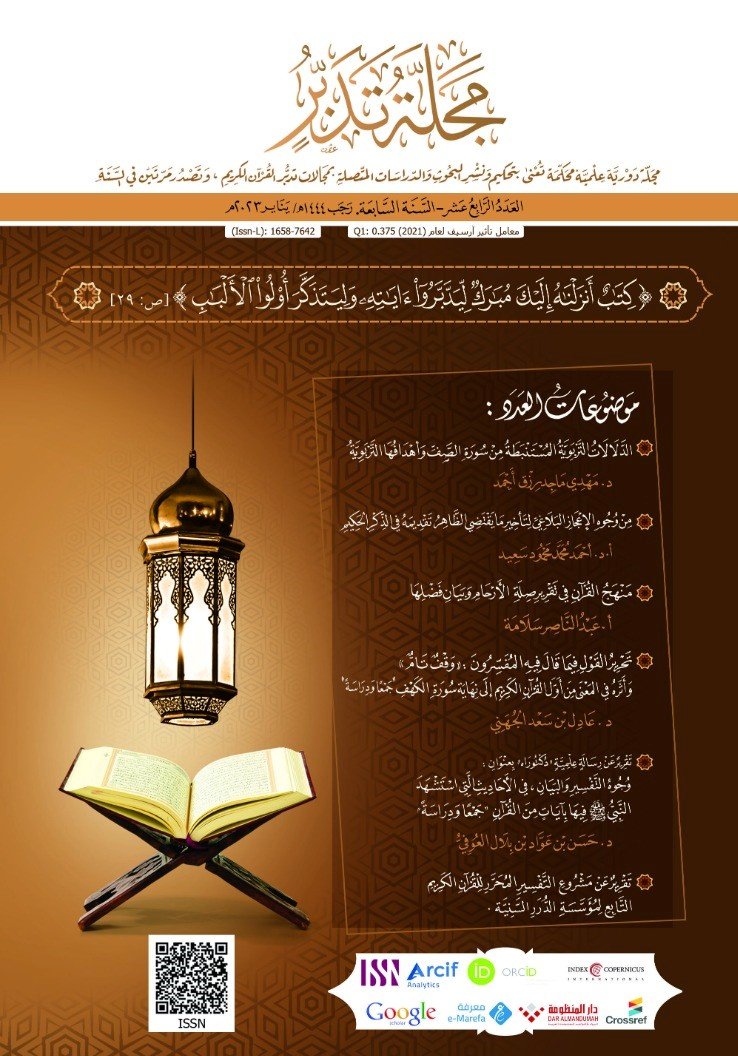منهج القرآن في تقرير صلة الأرحام وبيان فضلها
محتوى المقالة الرئيسي
الملخص
المستخلص
تناول هذا البحث موضوعًا قيِّمًا يندرج ضمن العلاقات الاجتماعية، وهو موضوع صلة الأرحام، وذلك من خلال الوقوف على المنهج الذي سَلَكه القرآنُ في تقرير هذه الخصلة، وبيان فضلها، وقد عَنونته بـ«منهج القرآن في تقرير صلة الأرحام، وبيانِ فضلها»؛ إذ كان هذا هو لُبَّ الموضوع.
وقد تضمن البحث -إلى جانب ذلك أيضًا- بيانًا لمفهوم صلة الرَّحم باعتبارها مركَّبًا إضافيًّا، ثم باعتبارها لقبًا، كما تضمن الحديث عن أبرز التعبيرات القرآنية المستعملة للدلالة بها على الرَّحِم؛ مثل: القرابة، والنَّسَب، والعشيرة، وغيرها.
وقد خلص هذا البحث إلى نتائج، منها:
- أن صلة الرحم تُعَدُّ -بحقٍّ- من أعظم الخصال القرآنية التي يمكن أن يتمثَّلها المؤمن في حياته، ويتقرَّب بها إلى ربِّه.
- أن صلة الرحم هي صلة الأقارب كيف كانوا؛ أي: دون تقييدٍ بمحرميَّةٍ، أو إرثٍ، أو أبوةٍ، أو أمومةٍ، أو قربٍ أو بُعدٍ في النَّسب.
- أن صلة الرحم لقبٌ يُطلق على الإحسان إلى ذوي القرابة من غير الوالدين؛ إذ صار للإحسان للوالدين لقبه الخاص، وهو «بِرُّ الوالدين».
- أن القرآن سَلَك في تقرير صلة الأرحام منهجين بارزين، وهما: المنهج الكميُّ القائم على تكرار الآيات في هذا الموضوع وإن بأساليب مختلفةٍ، والمنهج الكيفيُّ المبيِّن لتلك الأساليب.
- أن الأساليبَ المتَّبعةَ ضمن المنهج الكيفيِّ في تقرير هذا الموضوع عديدةٌ جدًّا، وأن منها الجليَّ الواضح، ومنها الخفيَّ الذي يحتاج إلى تدبُّرٍ، كما أن منها ما يعود إلى جهة البلاغة والنظم القرآنيِّ، ومنها ما يعود إلى جهة التشريع.
هذا، إلى جانب نتائجَ أخرى عديدةٍ وتوصياتٍ، ذكرتُها في خاتمة هذا البحث.
الكلمات المفتاحية: صلة الأرحام- العلاقات الاجتماعية- منهج القرآن- المنهج الكميُّ- المنهج الكيفيُّ.
##plugins.themes.bootstrap3.displayStats.downloads##
تفاصيل المقالة
القسم

هذا العمل مرخص بموجب Creative Commons Attribution-NonCommercial 4.0 International License.
وفقًا لمبادرة بودابست 2002م؛ توفر مجلة تدبر والتي تصدر عن مكتب خبرات طيبة للبحوث والدراسات بالمدينة المنورة الوصول الحر المجاني إلى إصداراتها، وتُطبِّق رخصة المشاع الإبداعي:
نَسب المُصنَّف – غير تجاري 4.0 دولي (Attribution- Non-Commercial 4.0 International (CC BY-NC 4.0)) للأعمال التي تنشرها من الأبحاث العلمية المحكمة والتقارير، والمتاحة مجانًا في شبكة الانترنت، وأنها تسمح لأي مستعمل بأن يقرأ، يُحمل، ينسخ، يوزع (تحويل)، يطبع، يبحث، أو ينشأ روابط نحو النصوص الكاملة لأبحاث المجلة وإصدارتها، وتحليلها آليا بغرض تكشفيها، أو إرسالها كبيانات للبرمجيات، أو استعمالها لأي هدف قانوني آخر، دون حواجز مالية، قانونية، أو تقنية أخرى تتجاوز تلك المتعلقة بالنفاذ للإنترنت في حد ذاته.
كما يمكنكم الاطلاع على سياسات المجلة للوصول المفتوح من هنا





